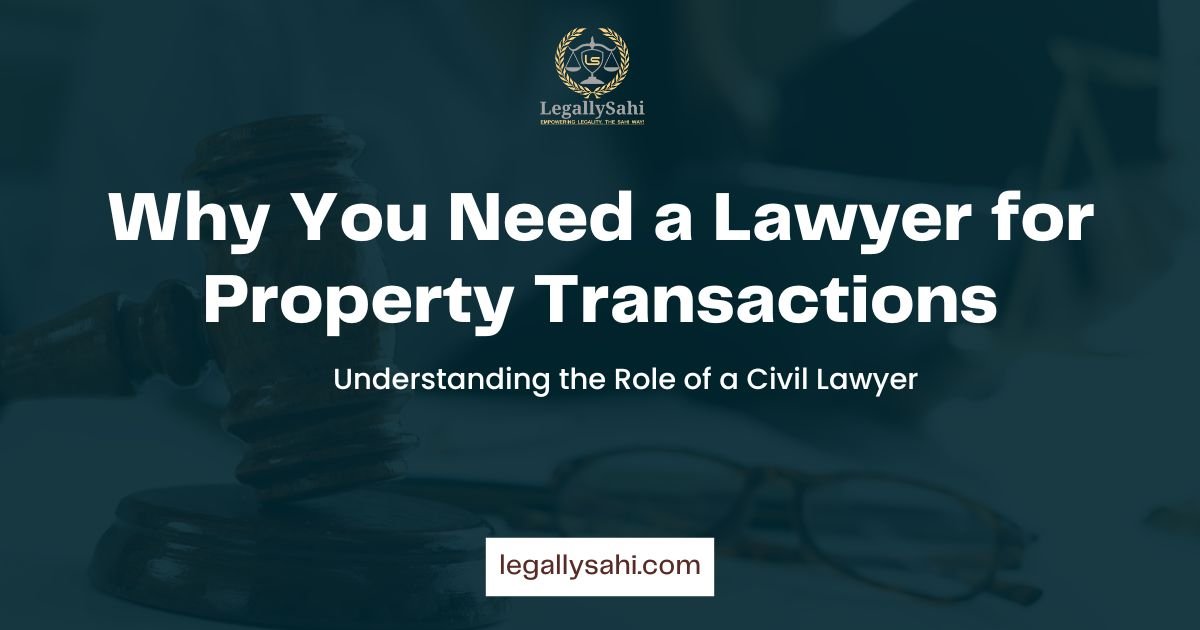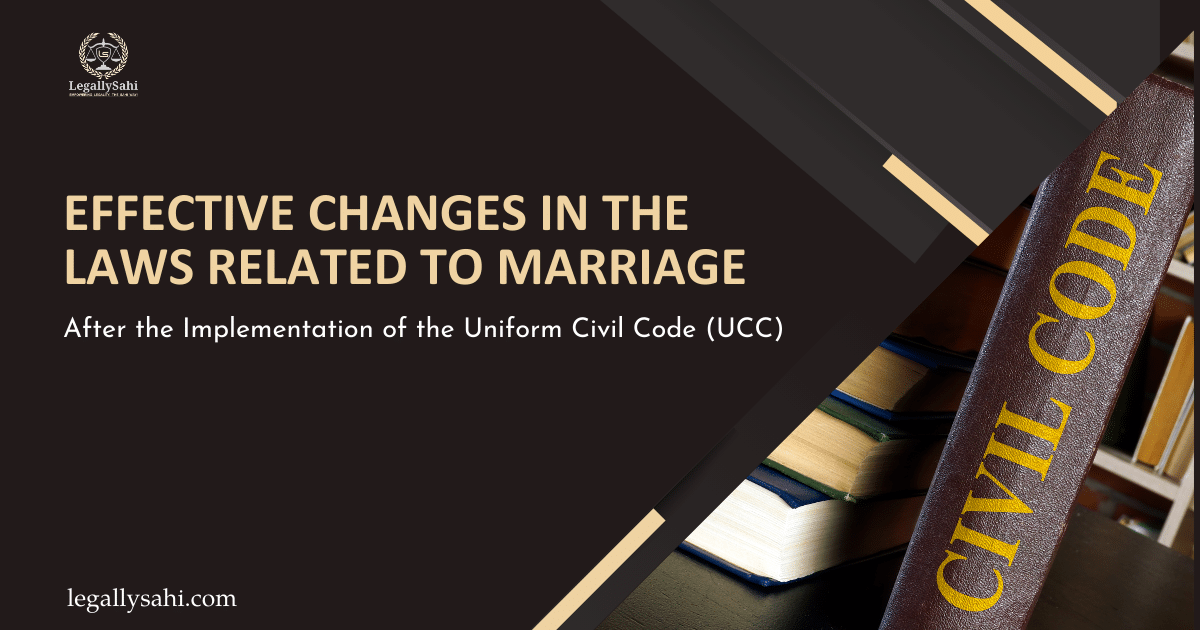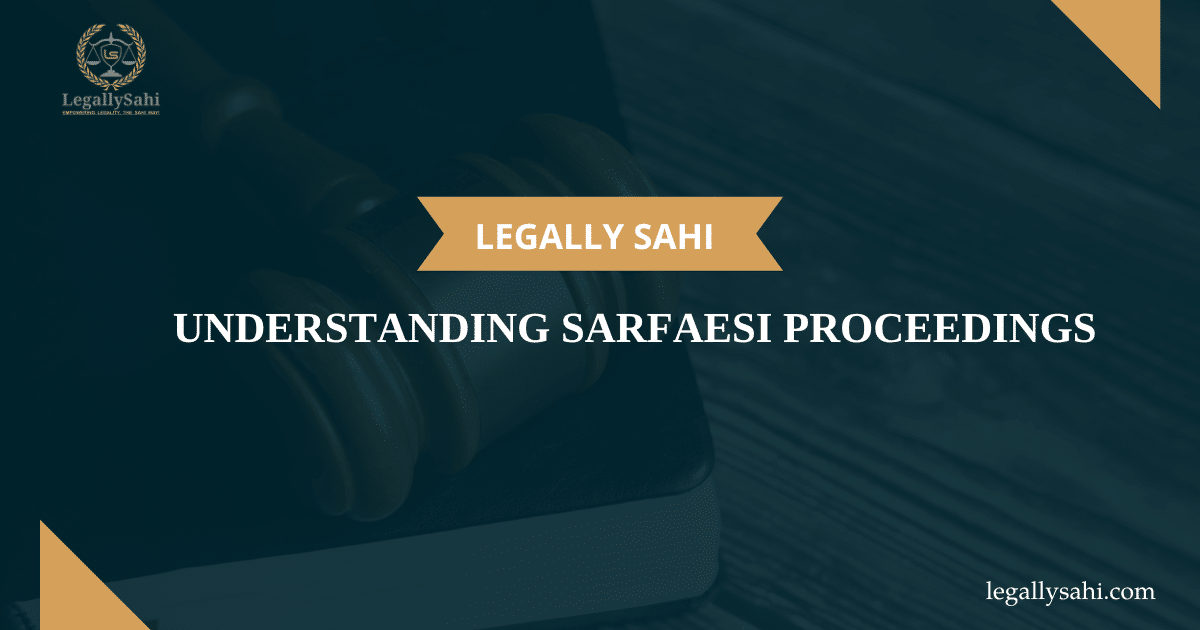Property transactions—whether buying, selling, or leasing—are significant financial decisions that involve intricate legal processes and potential risks. While some individuals may consider handling these transactions without legal assistance, the expertise of a qualified lawyer specializing in real estate law is crucial to ensure smooth and legally sound dealings. In this comprehensive guide, we’ll delve into the essential reasons why involving a lawyer is paramount for your property transactions, alongside key insights from Legally Sahi to navigate these processes effectively.
Understanding the Role of a Civil Lawyer
A Civil Lawyer specializes in real estate law and plays a pivotal role in various aspects of property transactions. Their expertise encompasses legal matters related to buying, selling, leasing, financing, and developing real estate properties. Here are the primary reasons why you should consider hiring a lawyer for your property transactions:
1. Legal Expertise and Knowledge
Property transactions involve intricate legal processes and documentation that can be challenging to navigate without legal expertise. A Civil Lawyer possesses in-depth knowledge of real estate laws, regulations, and local ordinances, ensuring that all aspects of your transaction comply with legal requirements. Whether drafting or reviewing contracts, conducting due diligence, or resolving legal disputes, a lawyer provides critical guidance to protect your interests.
Civil Lawyer stay updated with changes in real estate laws and regulations. This knowledge ensures they can provide accurate advice and navigate legal complexities effectively. For instance, in India, property transactions must comply with various laws, including the Transfer of Property Act, Registration Act, and local state laws governing property transactions. A lawyer ensures all legal requirements are met to avoid complications or legal challenges later.
2. Contract Drafting and Review
Contracts are fundamental to property transactions, outlining the terms and conditions agreed upon by all parties involved. A Civil Lawyer plays a crucial role in drafting and reviewing contracts to ensure clarity, accuracy, and fairness. They can identify potential pitfalls, negotiate favorable terms, and safeguard your rights throughout the transaction process. Additionally, lawyers ensure that all legal formalities are adhered to, minimizing the risk of disputes or litigation in the future.
Property transactions involve complex legal documents, such as sale deeds, lease agreements, and mortgage documents. A Civil Lawyer ensures these documents accurately reflect the intentions of all parties involved and comply with legal requirements. For example, in a sale transaction, the lawyer verifies that the sale deed includes all essential terms, such as the description of the property, sale consideration, and conditions of sale. This meticulous approach prevents misunderstandings and disputes over contract terms.
3. Due Diligence and Property Research
Before entering into any property transaction, thorough due diligence is essential to uncover potential issues that may affect the property’s value or legality. Civil Lawyer conduct comprehensive research, including title searches, zoning compliance checks, environmental assessments, and liens verification. This diligence ensures that you have a clear understanding of the property’s status and mitigates risks associated with undisclosed liabilities or encumbrances.
Due diligence is crucial in property transactions to verify the property’s ownership, legality, and potential liabilities. A Civil Lawyer conducts thorough searches to confirm the seller’s title to the property, ensuring there are no disputes or claims that could affect your ownership rights. For instance, they check land records and title deeds to confirm the property’s ownership and history of transactions. This proactive approach helps you make informed decisions and avoid purchasing property with legal issues.
4. Legal Documentation and Compliance
Property transactions require extensive documentation, including deeds, mortgages, leases, and transfer agreements. A Civil Lawyer ensures that all legal documents are prepared accurately, comply with state or local regulations, and protect your legal rights. They manage the complexities of documentation, including the recording and filing of necessary paperwork with relevant authorities, to ensure the transaction’s validity and enforceability.
In property transactions, legal documentation plays a crucial role in establishing and protecting your rights as a buyer, seller, or lessee. A Civil Lawyer prepares and reviews legal documents to ensure they accurately reflect the parties’ intentions and comply with applicable laws. For example, in a lease agreement, the lawyer ensures that the terms regarding rent, maintenance responsibilities, and lease duration are clearly defined and enforceable. This meticulous approach minimizes the risk of disputes and provides legal recourse in case of contract breaches.
5. Negotiation and Dispute Resolution
In property transactions, negotiations often arise regarding price, terms, repairs, and contingencies. A skilled Civil Lawyer serves as your advocate during negotiations, leveraging their knowledge of market conditions and legal rights to achieve favorable outcomes. Should disputes arise, whether related to contract breaches or property defects, lawyers provide effective dispute resolution strategies, including mediation, arbitration, or litigation if necessary.
Negotiation skills are essential in property transactions to secure favorable terms and resolve conflicts amicably. A Civil Lawyer represents your interests during negotiations, advocating for terms that protect your financial investment and legal rights. For instance, they negotiate purchase prices, lease terms, and repair responsibilities to ensure a fair and equitable agreement for all parties involved. In case of disputes, the lawyer employs dispute resolution techniques, such as mediation or arbitration, to achieve timely and cost-effective resolutions.
6. Risk Assessment and Mitigation
Property transactions involve inherent risks that can impact financial investments and legal liabilities. Civil Lawyer assess potential risks associated with the transaction, such as property defects, boundary disputes, tax implications, or regulatory issues. By identifying risks early, lawyers develop proactive strategies to mitigate these risks and protect your investment interests.
Risk assessment is crucial in property transactions to identify and mitigate potential risks that could affect the transaction’s outcome. A Civil Lawyer conducts thorough risk assessments to evaluate factors such as property condition, legal compliance, and financial implications. For example, they assess property surveys and inspection reports to identify structural defects or environmental hazards that could impact property value or future development plans. This proactive approach enables you to make informed decisions and avoid potential legal and financial pitfalls.
7. Complex Legal Issues and Special Circumstances
Certain property transactions involve complex legal issues or special circumstances that require specialized legal knowledge. For instance, commercial real estate transactions, development projects, inheritance or trust properties, and cross-border transactions may entail unique legal considerations. Civil Lawyer offer expertise in handling these complexities, ensuring compliance with specific legal requirements and achieving optimal outcomes tailored to your situation.
Complex property transactions require specialized legal expertise to navigate unique legal challenges and achieve favorable outcomes. A Civil Lawyer provides strategic advice and solutions for complex issues, such as zoning restrictions, land use regulations, and tax implications. For example, in commercial real estate transactions, the lawyer negotiates lease agreements, conducts feasibility studies, and coordinates due diligence efforts to facilitate property acquisition or development projects. This specialized approach ensures compliance with regulatory requirements and minimizes legal risks associated with complex transactions.
8. Compliance with Regulatory Requirements
Real estate transactions are subject to various regulatory requirements imposed by federal, state, or local authorities. Civil Lawyer ensure that your transaction complies with all applicable laws, regulations, zoning ordinances, and environmental standards. They navigate regulatory complexities, obtain necessary permits or approvals, and address compliance issues to prevent legal challenges that could delay or jeopardize the transaction.
Compliance with regulatory requirements is essential in property transactions to ensure legal validity and mitigate potential risks. A Civil Lawyer monitors changes in laws and regulations that may impact property transactions, such as zoning amendments or environmental regulations. For example, they obtain zoning permits for property development projects and ensure compliance with environmental impact assessments to avoid legal disputes or penalties. This proactive approach enables you to proceed with confidence and minimize disruptions in your property transactions.

Why Choose Legally Sahi for Your Property Transactions?
Legally Sahi is committed to simplifying your property transactions by connecting you with experienced Civil Lawyer who provide:
Expert Legal Guidance:
Access to knowledgeable lawyers who specialize in real estate law and possess a deep understanding of local legal nuances.
Comprehensive Services:
Assistance throughout the transaction process, from contract drafting and negotiation to due diligence and closing.
Peace of Mind
Assurance that your property transaction is conducted legally and efficiently, minimizing risks and ensuring your rights are protected.
Conclusion
Navigating property transactions without legal guidance can expose you to significant risks and potential legal pitfalls. A Civil Lawyer from Legally Sahi serves as your trusted advisor, offering critical legal expertise, ensuring compliance with regulatory requirements, and safeguarding your interests throughout the transaction process. Whether you’re buying, selling, or leasing property, investing in professional legal assistance ensures a smooth and secure transaction, providing peace of mind for your real estate endeavors.
By prioritizing legal assistance from the outset, you can mitigate risks, maximize opportunities, and achieve successful outcomes in your property transactions. Contact Legally Sahi today to connect with experienced Civil Lawyers and embark on your property transaction journey with confidence.





